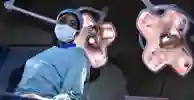Operating Department Practice Apprenticeship
About the course
Operating Department Practitioners (ODPs) are highly-skilled members of the surgical team who support patients in the dynamic and fast paced perioperative setting.
The ODP degree apprentice programme can be accessed from a range of health care settings and is an ideal opportunity to undertake work based experiential and reflective learning whilst being employed. Throughout your 3-year degree you will study alongside other student ODP’s on their BSc (Hons) Operating Department Practitioner programme. You will work and be assessed in a variety of specialist areas such as general surgery, orthopaedic surgery, ear, nose and throat, obstetric surgery, anaesthetic and post-anaesthetic care (recovery).
Assessment within the perioperative setting is achieved via demonstration of clinical competency and documented in an e-portfolio. It has been designed by the programme team to allow you the opportunity to demonstrate the skills knowledge and behaviours associated with operating department practice across a broad range of surgical specialities. There is a strong emphasis on evidence-based practice and clinical decision making throughout as you work towards achieving the required standards of proficiency. The programme is fully approved and upon completion you will be eligible to apply for registration with the Health and Care Professions Council and work under the protected title as an Operating Department Practitioner.

Olayemi Elizabeth Ajayi - Operating Department Practice - University of Hull
1 min
Study
Year 1 - modules provide a foundation for safe effective practice in the work place and seek to instil a professional identity. There is a strong emphasis placed upon fundamental practical skills, which are developed alongside the skills and traits associated with reflective practitioners.
Year 2 - modules build upon the learning from the previous year, it affords the apprentice an opportunity to demonstrate reflective and analytical skills related to the 3 phases of perioperative practice (anaesthetics, intraoperative and post anaesthetic care). The work placed element continues and complements the taught theory, as the apprentice begins to develop more complex reasoning and analytical skills.
Year 3 – this final year of the programme provides an opportunity to demonstrate a holistic approach to assessment, planning, implementation and evaluation of care. The emphasis is upon evidence-based practice and autonomous self-directed learning. This is very evident in the contextualising enhanced roles, literature review and leadership modules. You will be well prepared for the final Transition to Professional Practice module and will have met all of the gateway requirement of the apprenticeship standard. The assessment of this module is undertaken in the workplace by an independent end point assessor, it consists of an observation of your practice, followed by questions aimed at showcasing and assessing your underpinning knowledge.
Modules

Future prospects
As a qualified ODP, you are trained in all areas of theatre work and can specialise in surgery, anaesthetics or post-anaesthetic care. You can develop your role through teaching or pursue theatre management roles. New areas of practice are also opening up to ODPs such as accident and emergency and intensive care units. Career opportunities exist within NHS hospital trusts and private hospitals, primary care trust clinics and the armed forces.
Entry requirements
The Apprentices should:
- Be currently employed in an appropriate health care setting and have the written support of their employer.
- Hold an appropriate Level 3 qualification e.g. Senior Healthcare Support Worker Apprenticeship, Subsidiary Diploma or NVQ level 3 in Health and Social Care.
- As well as the level 3 qualification have undertaken or be able to evidence the equivalent of 20 credits at level 4 (for example the university study skills module) or undertake and submit an essay demonstrating level 4 entry standard and the application of knowledge and experience relating to perioperative practice.
- Possess GCSE English and Maths (Grade C or 4, or above) or Functional Skills level 2 Literacy and Numeracy.
- An Enhanced Disclosure and Barring Service check, arranged via your employer, is also required.
- If English is not your first language, IELTS 7.0 or above with no element below 6.5 (or equivalent) is required.
- Be flexible as there may be a requirement to work shifts alongside their mentor
- Be able to provide evidence of study within the previous three years.
- Candidates holding 112 UCAS tariff point equivalence may also apply
Those interested in this course should first discuss the matter with their employer and then apply by completing the application form.
How to apply
To apply, please complete the below downloadable forms.
Please email them to fhs.admiss@hull.ac.uk
On receipt of both forms, applications will be shortlisted and successful candidates will be invited to attend a values-based interview conducted by the employer and University staff.
Any offers made for a place on the course are subject to:
- Being aged 18 at the commencement of the programme
- Completion of an annual Good Health and Good Character declaration
- Employer confirmation of Occupational Health clearance and completion of mandatory skills training and updates
- Enhanced Disclosure and Barring Service check, arranged via your employer
For more information, please contact us and we will be happy to support
Get in touch